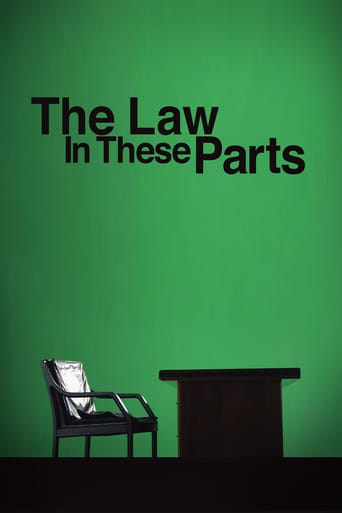Mike B
Very absorbing and forces one to listen.All the following are demonstrated by this film:The history of Israel since the 1967 six-day war is narrated. There were increasing Orwellian distortions of law.In Israel there is one law for Israel proper and another for the occupied territories. The occupied territories were allowed to be settled by playing with words in the Israeli Supreme Court. Israelis living in the occupied territories are given preferential treatment over non-Israelis. In other words, with the full support of the Israeli legislature, Palestinian land in the Occupied Territories was stolen.The Israeli military uses its justice to rule the Occupied Territories. It changes the terms of justice at a whim.Palestinians have been tortured with the knowledge of the Israeli legislature.
runamokprods
Unique and oddly powerful documentary. Essentially a series of talking heads; interviews with the military judges who presided over the military courts in the territory Israel annexed during the 6 day war.. Mixed in, occasionally playing behind these men on a green screen are snippets of archival footage of the conflicts in the occupied territories. Hearing this description, one could well assume the film would be dry and academic, but the ideas beneath what it being quietly discussed are so powerful and disturbing that the film works as a kind of documentary theater piece. By focusing on one specific aspect of the Israeli-Palestinian conflict, Israeli filmmaker Alexandrwicz gives a deeper sense of the legal and moral hypocrisy and inhumanity of Israel's treatment of the Palestinians than many wider ranging and flashier documentaries. By simply having these judges try to explain the odd military justice applied to the native people of the land Israel occupied, and how the courts kept bending and twisting both words and international law to justify their actions, (for example, under the Geneva conventions, an occupying nation is not allowed to move civilians from their country into the occupied land. So how to make the settlements legal? The Israeli supreme court simply changed the wording, saying that henceforth the territories were no longer 'occupied' but 'held'. As if changing the word could justify the behavior -- even though just about every Judge uses the term 'occupied territory' in the film.) One is left with a sad and sickening feeling. As these judges admit to knowing that an accused had been tortured into confessions, that not only the accused but even the judges themselves were often not allowed to know the details of the case and the accusations, that the judges had to simply take the word of the army prosecutors, since just about everything was labeled 'classified', it's hard not to see echoes of the recent legal overreach in America towards accused terrorists. The personalities of the judges are fascinating as well. Some clearly feel guilt about their actions, other ambivalence, others are defensive, and yet others seem to blithely miss just how twisted and sad their self-justification sounds. Whatever you feel about the incredibly complex middle east situation, where there is plenty of guilt on all sides, this film is a powerful indictment of when the supposed 'rule of law' becomes instead a cudgel to control a people, and justify questionable policy.I found the film only grew on a second viewing. Far from feeling repetitive I was able to follow in even deeper detail, and contemplate in more depth the complex issues being examined. I found myself more emotionally effected. I also was able to more fully appreciate just how inventively the film-makers had incorporated green screen techniques to give an unusual power to their interviews, and create as documentary that was actually quite cinematic, in it's unique way.

